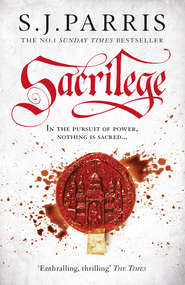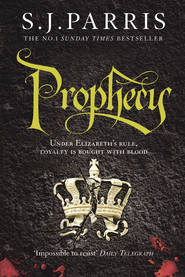По всем вопросам обращайтесь на: info@litportal.ru
(©) 2003-2024.
✖
Treachery
Автор
Год написания книги
2019
Настройки чтения
Размер шрифта
Высота строк
Поля
‘What use are you in London now that the new Ambassador means to watch your every step, or kick you out altogether? You are no use to anyone at present, Bruno, not without patronage.’
I turn sharply away, keeping silent until I can trust myself to speak without betraying my anger. I can feel him simmering beside me, tapping the stem of the clay pipe hard against the wooden guardrail until it snaps and he throws it with a curse into the sea.
‘Thank you for reminding me of my place, Sir Philip,’ I say at length, in a voice that comes out tight and strangled.
‘Oh, for the love of Christ, Bruno! I meant only that you are of more use on this voyage than anywhere else, for now. Besides, he asked for you.’
‘Who did?’
‘Francis Drake. That’s why I invited you.’
I frown, suspicious.
‘Drake doesn’t know me. Why would he ask for me?’
‘Well, not by name. But this summer, in London, he asked me if I could find him a scholar to help him with something. He was very particular about it, though he would not explain why.’
‘But you are a scholar. Surely he knows that?’
‘I won’t do, apparently. He is looking for someone with a knowledge of ancient languages, ancient texts. A man of learning and discretion, he said, for a sensitive task. I told him I knew just the fellow.’ He beams, slinging an arm around my shoulder, all geniality again. ‘He told me to bring you to Plymouth when I came. Think, Bruno – I don’t know what he wants, but if you could do him some sort of service, it might smooth our way to a berth aboard his ship.’
I say nothing. When he invited me on this journey to Plymouth, he showered me with flattery: he could not dream of going without me, he said; he would miss my conversation; there was no one among his circle at court he would rather travel with, no one whose company he prized more highly. Now it transpires that he wants me as a sort of currency; something he can use to barter with Drake. Like a foolish girl, I have allowed myself to be sweet-talked into believing he wanted me for my own qualities. I also know that I am absurd to feel slighted, and this makes me all the more angry, with him and with myself. I shrug his arm off me.
‘Oh, come on, Bruno. I cannot think of going without you – what, left to the company of grizzled old sea dogs for months on end, with no conversation that isn’t of weevils and cordage and drinking their own piss? You would not abandon me to such a fate.’ He drops to one knee, his hands pressed together in supplication.
Reluctantly, I crack a smile. ‘Weevils and drinking our own piss? Well then, you have sold it to me.’
‘See? I knew you would not be able to resist.’ He bounces back to his feet and brushes himself down.
Our friendship has always been marked by good-natured teasing, but his earlier words have stung; perhaps this is truly how he views me. Nothing without patronage.
‘Seriously, Philip,’ I turn to look him in the eye. ‘To risk the Queen’s displeasure so brazenly – are you really willing? I am not sure that I am.’
‘I swear to you, Bruno, by the time we come home, the sight of the riches we bring to her treasury will make her forget on the instant.’ When I do not reply, he leans in, dropping his voice to a whisper. ‘You do realise the money Walsingham pays you is not charity? He pays you for information. And if the Baron de Châteauneuf has as good as banished you, how can you continue to provide it?’
‘I will find a way. I always have before. Walsingham knows I will not let him down.’
‘Come, Bruno!’ He gives me a little shake, to jolly me along. ‘Do you not yearn to see the New World? What good is it to dream of worlds beyond the fixed stars if you dare not travel our own globe?’ He pushes a hand through his hair so that the front sticks up in tufts, a gesture he makes without knowing whenever he is agitated. ‘You’re thirty-seven years old. If you want nothing more from life than to sit in a room with a book, I can’t think why you ever left the cloister.’
‘Because I would have been sentenced to death by the Inquisition,’ I say, quietly. As he well knows. But how do you explain to a man like Sidney the reality of a life in exile? ‘And what of your wife and child?’ I add, as he stretches again and turns as if to leave.
He looks at me as if he does not understand the question. ‘What of them?’
‘Your first child is due in, what, three months? And you mean to be halfway across an ocean.’ With no good odds on returning, I do not say aloud. Even I know that Francis Drake’s famous circumnavigation returned to England with only one ship of six and a third of the men. But Sidney is as irrepressible as a boy when he sets his heart on something; he clearly believes there is no question but that we will return triumphant with armfuls of Spanish gold.
He frowns. ‘But I have done my part. She will have the child whether I am there or not, and there will be nursemaids to take care of it. God’s blood, Bruno, I have done what they asked of me, I have got an heir, that is why they have had me cooped up at Barn Elms for the past two years. Am I not permitted a little freedom now?’
I am tempted to observe that he has possibly misunderstood the nature of marriage, but I refrain; I am hardly qualified to advise him about women. Besides, there is no profit in making him more irritable. His anger, I see now, is not at me, but at everyone who would voice the same objections: his wife, his father-in-law, Francis Drake, the Queen. He is rehearsing his self-justification. I have great affection for Sidney, and he has many qualities I admire, but he can be spoilt and does not respond well to being thwarted.
‘It might be a girl,’ I reply.
He makes a noise of exasperation. ‘I am going back down for a drink. Are you coming?’
‘I think I will stay here for a while.’
‘As you wish.’ At the head of the stairs to the main deck he turns back, one hand on the guardrail. ‘You know, I am trying to find a way to help you, Bruno. I thought I might have a little more thanks than this.’ He sounds wounded. In my amazement at his mad scheme, it had not occurred to me that I might have hurt his feelings.
‘Forgive me. I am grateful for your efforts – do not think otherwise.’
‘You are coming, then? To the New World?’ His face brightens.
‘Let me get used to the idea.’
He disappears to the lower deck and I return my attention to the restless black water that surrounds us. Two weeks of this had seemed a diversion; months on end is another proposition entirely. In sunlight, the sea looked benign, obliging; now its vastness strikes me as overwhelming. To challenge it, to attempt to best it with such a small vessel, appears grotesquely presumptuous. But perhaps all acts of courage look like folly at first. The breeze lifts my hair from my face, and I realise that the sun has fully set and the horizon is no longer visible on either side. There is no divide between sea and sky, nothing but endless darkness and the indifferent stars.
TWO (#ulink_4291174c-e199-5923-9ddf-fb9690e2c538)
We round the headland into Plymouth Sound two days later, early evening on 23rd August, as a cheer goes up from the men on deck. The wind has not been on our side since we passed the coast of Kent and moved into the English sea, making our progress slower than Knollys had predicted, but now the sky is clearer overhead, the sun glistening on a broad bay, surrounded on three sides by gently sloping cliffs, dark green with thick tree cover. Sidney and I have been standing at the prow for the past hour, craning for the first sight of the harbour, but nothing could have prepared me for the spectacle of the fleet anchored in the Sound.
Some thirty ships of varying sizes, the largest painted black and white and greater even than the Galleon Leicester, stand at anchor; between the great painted fighting ships and merchantmen, ten or so smaller pinnaces rock gently on the swell, sails furled, pennants snapping, their heraldic colours bright against the pale sky. The water sparkles and the whole has the appearance of a marvellous pageant. I find myself staring open-mouthed with delight like a child, Sidney likewise, as the crewmen on deck send up another cheer at the sight of their comrades. Until this moment, I would not have claimed any great interest in seafaring, but the assembled fleet is truly a sight to stir a sense of adventure. I picture all these ships sailing out in formation at Drake’s command, pointed towards the New World, Sidney and me at the prow, squinting into the sun towards an unknown horizon. And returning, to the salute of cannon from the Plymouth shore, our pockets bursting with Spanish gold. Sidney really believes this is possible; now that we are here, it is hard not to be infected by his conviction. All about us, a volley of shouted commands is unleashed, followed by the heavy slap of canvas as sails are furled, ropes heaved, chains let out with a great clanking of metal on metal, and the vast creaking bulk of the Galleon Leicester slows almost to a standstill as her anchors are dropped and rowboats lowered down her sides to the water. Knollys turns to us, eyes bright with pride, as if this show is all his doing.
‘There, gentlemen, you see the flagship, the Elizabeth Bonaventure, Sir Francis Drake’s own command. And there, the Tiger, captained by Master Carleill.’
He points across the Sound; Sidney shoots me a sideways look and a grimace. Half the investors in this expedition he knows from court, many of the officers men with connections to his own family. He will have to keep his plans quiet until the voyage is underway, for fear of Walsingham finding out.
Knollys continues, oblivious, his outstretched arm casting a long shadow over the deck as he gestures: ‘Across the way you have the Sea Dragon, the White Lion and the Galliot Duck, and there the little Speedwell, and beside her the Thomas Drake, named for the Captain-General’s brother and under his command.’
We are near enough to see the crews of the other ships, men scuttling up and down rigging and swarming over the decks like insects. Now that we are at ease in the shelter of the harbour, the breeze has dropped and I feel the warmth of the sun on my back for the first time since we left London.
‘And what is that island?’ I ask, pointing to a mound of rock in the middle of the Sound. Sheer cliffs rise to a wooded crest, and at the summit, a stone tower peeps above the treeline.
‘St Nicholas Island,’ Knollys says, shading his eyes, ‘though the locals call it Drake’s Island. Sir Francis has been trying to raise money to improve the fortifications in case of invasion. There was a garrison there in years past, though I believe it has fallen out of use for lack of funds. But come – the Captain-General, as we must call him on this voyage, will be expecting us.’
He leads us down a flight of stairs below deck, where he calls for rope ladders to be dropped over the side through a hatch. These are thin, precarious-looking contraptions, but Knollys swings himself easily into the gap and shins down to the two stout sailors holding the end of the ladder steady in the rowboat below. Sidney nudges me to follow, and a silent sailor hands me through the hatch, where I climb without looking down, gripping the ropes until my palms burn, placing one foot below the other, conscious all the while of Sidney’s impatient feet inches above my head.
The oarsmen negotiate a path between the anchored ships and from this vantage point, at the waterline, you understand the immensity of these galleons; their hulls the height of a church, their masts disappearing to a point so high you have to crane your neck until you are almost lying horizontal to see the top. Navigating through them you feel as if you are in a narrow lane between high buildings, if buildings were uprooted from their foundations and could lurch and heave at you. A hearty melody of flutes and viols carries across the water, accompanied by raucous singing that collapses into laughter after one verse. A few more strokes of the oars and our boat cracks against a sheer wooden cliff scaled with barnacles, where another ladder sways, awaiting us. I glance at my palms. Sidney notices and laughs.
‘Don’t expect to go home with the soft hands of a gentleman, Bruno.’
‘I’m not sure I have ever had the soft hands of a gentleman,’ I say. I hold them out and regard them on both sides, as if for evidence. My fingertips are stained with ink, as always.
‘That’s not what the ladies of the French court say,’ he replies, with a broad wink. It is one of Sidney’s favourite jokes: that I worked my way through the duchesses and courtesans of Paris before turning my keen eye to England. It amuses him that I was once a monk; he cannot imagine how I managed to keep to it all those years, the most vigorous years of my youth. He can only picture how he himself would have been, and so he likes to joke that, since leaving holy orders, I go about rutting everything in sight like a puppy on a chair leg. It amuses him all the more for being untrue.
Knollys precedes us up the ladder; Sidney follows and I am left to bring up the rear. This ship is higher even than the Leicester; my arms begin to ache and the ladder shows no sign of ending. I dare not look anywhere except directly in front of me, at the snaking ropes and the wooden wall that grazes my knuckles each time the swell knocks me against it. As my head draws level with the rail, I reach out to grasp it and my hand slips; for a dizzying moment I fear I may lose my footing, but a strong hand grips my wrist and hauls me inelegantly over the side.
‘Steady there.’
I regain my balance, take a breath, and look up to face my rescuer.











